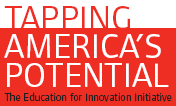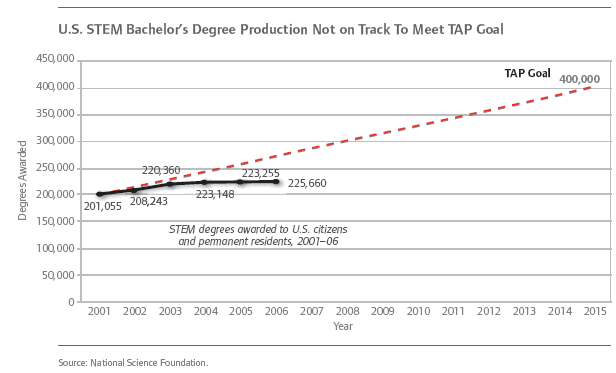|
|
|
|
|
|
|
News & Views item - July 2008 |
![]() US Business Groups Call for Action to Enhance Competitiveness. (July
24, 2008)
US Business Groups Call for Action to Enhance Competitiveness. (July
24, 2008)
 A
group of 16* business
organizations known as
Tapping
America's Potential (TAP) released an update on their goal to
double the number of science, technology, engineering and mathematics (STEM)
graduates with bachelors degrees by 2015 -- specifically to "increase the annual
number of U.S. science, technology, engineering and mathematics bachelorís-level
graduates to 400,000". The 19-page report,
Gaining Momentum, Losing Ground
A
group of 16* business
organizations known as
Tapping
America's Potential (TAP) released an update on their goal to
double the number of science, technology, engineering and mathematics (STEM)
graduates with bachelors degrees by 2015 -- specifically to "increase the annual
number of U.S. science, technology, engineering and mathematics bachelorís-level
graduates to 400,000". The 19-page report,
Gaining Momentum, Losing Ground![]() ,
includes calls for funding levels consistent with those authorized in the
America COMPETES Act and for expanding STEM education
programs.
,
includes calls for funding levels consistent with those authorized in the
America COMPETES Act and for expanding STEM education
programs.
In introducing their progress report TAP writes:
TAP and other business, scientific and education coalitions helped to galvanize broad bipartisan agreement among federal policymakers on the need for action on U.S. competitiveness. Despite this consensus, and the enactment of landmark authorizing legislation, Congress and the administration have thus far failed to adequately fund the innovation policy agenda advocated by TAP.
Americaís business leaders are frustrated that while governments around the world are building their national innovation capacity through investments in research and STEM education, the United States is standing still. Failure to change the status quo places Americaís future economic and technological leadership at risk.

And in a comment that could be an assessment of Australia's Minister for Innovation, Industry, Science and Research, Senator Kim Carr's approach to his portfolio:
In a disheartening repeat of previous years, deep consensus and nearly unique bipartisan agreement on the need to make innovation a priority did not, in the end, result in significant increased funding for basic research in the physical sciences or STEM education. Instead, appropriations provided either flat funding or real declines in fiscal year (FY) 2008, in constant dollar terms, for research and education programs.
The essence of the organisation's conclusions are summarised:
It is incumbent upon the business community to maintain the pressure on
policymakers to see that the TAP agenda is fully enacted and implemented. In
particular, TAPís priorities include:
Funding basic science and engineering research at U.S. universities at the
levels authorized in the America COMPETES Act;
Funding STEM education programs at the levels authorized in the America COMPETES
Act, including funds for expanding the Robert Noyce Scholarship Program at NSF,
Math and Science Partnerships (MSP) programs at both NSF and the Department of
Education, Math Now, Adjunct Teacher Corps, and programs to develop and expand
Advanced Placement and International Baccalaureate programs;
Enacting targeted reforms to welcome more highly educated foreign-born
professionals into the United States; and
Complementing federal action with state, local and private-sector initiatives.
All the while the reality is that the Bush administration's approach lies in talking the talk while recent pronouncements by Australia's Senator Carr look as though he is attempting to find a cheap micromanaged fix.
_________________________________________________
*AeA, Business-Higher Education Forum, Business Roundtable, Council on Competitiveness, Information Technology Association of America, Information Technology Industry Council, Minority Business RoundTable, National Association of Manufacturers, National Defense Industrial Association, National Venture Capital Association, Semiconductor Industry Association, Software & Information Industry Association, TechNet, Technology CEO Council, Telecommunications Industry Association, U.S. Chamber of Commerce.